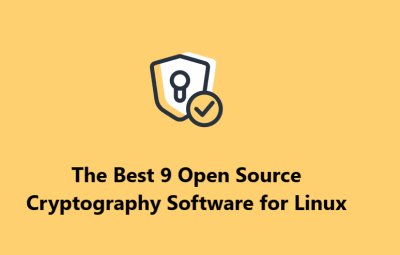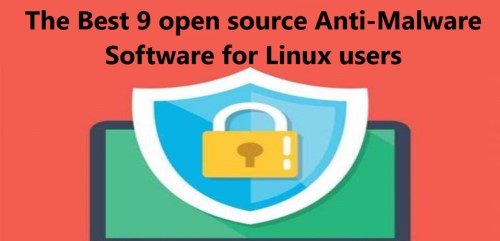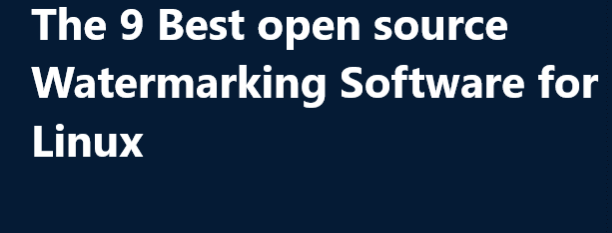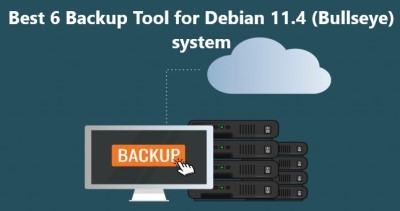The Best 9 Open Source Cryptography Software for Linux
Linux SoftwareCryptography software is an essential tool for protecting data, communications, and digital assets. Open source cryptography software offers an alternative to proprietary options on the market, providing a variety of features and flexibility.
Here at IbmiSoft, We will explore 9 open source cryptography software in Linux.
Table of contents [Show]
1. GnuPG (GNU Privacy Guard):
GnuPG, or GNU Privacy Guard, is a free and open source implementation of the OpenPGP standard. It is a command-line tool that allows users to encrypt, decrypt, sign and verify files and emails using public-key cryptography. GnuPG is available for Linux, Mac OS X, Windows and other systems.
It's Official Website: https://gnupg.org/
Pros of using GnuPG:
- Open source
- Easy to use
- Supports many algorithms (AES, 3DES, etc.)
- Supports file and email encryption
- Encrypt and sign data
- Create and manage keyrings
- Generate and manage keys
- Verify signatures
- Encrypt and decrypt files
Cons:
- Difficult for new users
- Can be slow
- No graphical user interface
How to install GnuPG in Linux ?
Run the following command in a terminal window:
$ sudo apt-get install gnupg
2. Cryptix:
Cryptix is an open source cryptography library written in Java. It supports a wide range of algorithms and formats, including AES, RSA, SHA-1 and SHA-2. Cryptix is available for Linux, Windows and Mac OS X.
It's Official Website: http://www.cryptix.org/
Pros of using Cryptix:
- Open source
- Easy to use
- Highly secure
- Supports many algorithms
- Encrypt and decrypt data
- Create and manage keys
- Sign and verify data
- Generate random numbers
Cons:
- No graphical user interface
- Can be slow
How to install Cryptix on Linux ?
Download the latest version of Cryptix from the official website and extract the files. To install Cryptix, run the following command in a terminal window:
$ sudo apt-get install cryptix
3. OpenSSL:
OpenSSL is an open source implementation of the Secure Sockets Layer (SSL) and Transport Layer Security (TLS) protocols. It is used to secure web traffic and is available for Linux, Windows and Mac OS X.
It's Official Website: https://www.openssl.org/
Pros of using OpenSSL:
- Open source
- Easy to use
- Highly secure
- Supports many algorithms
- Encrypt and decrypt data
- Create and manage keys
- Sign and verify data
- Generate random numbers
Cons:
- No graphical user interface
- Can be slow
How to install OpenSSL on linux ?
Run the following command in a terminal window:
$ sudo apt-get install openssl
4. TrueCrypt:
TrueCrypt is a free and open source disk encryption software for Linux, Windows and Mac OS X. It allows users to create encrypted containers, which can be used to store sensitive data.
It's Official Website: https://www.truecrypt.org/
Pros of using TrueCrypt:
- Open source
- Easy to use
- Highly secure
- Supports many algorithms
- Encrypt and decrypt data
- Create and manage containers
- Protect data with passwords
- Generate random numbers
Cons:
- No graphical user interface
- Can be slow
How to install TrueCrypt on Linux ?
Download the latest version of TrueCrypt from the official website and extract the files. To install TrueCrypt, run the following command in a terminal window:
$ sudo apt-get install truecrypt
5. OpenVPN:
OpenVPN is an open source software for creating secure virtual private networks (VPNs). It is available for Linux, Windows and Mac OS X.
It's Official Website: https://openvpn.net/
Pros of using OpenVPN:
- Open source
- Easy to use
- Highly secure
- Supports many algorithms
- Create secure virtual private networks
- Encrypt and decrypt data
- Create and manage keys
- Sign and verify data
- Generate random numbers
Cons:
- No graphical user interface
- Can be slow
How to install OpenVPN on Linux ?
Run the following command in a terminal window:
$ sudo apt-get install openvpn
6. Nettle:
Nettle is an open source cryptographic library written in C. It supports a wide range of algorithms and formats, including AES, RSA, SHA-1 and SHA-2. Nettle is available for Linux, Windows and Mac OS X.
It's Official Website: http://www.lysator.liu.se/~nisse/nettle/
Pros of using Nettle:
- Open source
- Easy to use
- Highly secure
- Supports many algorithms
- Encrypt and decrypt data
- Create and manage keys
- Sign and verify data
- Generate random numbers
Cons:
- No graphical user interface
- Can be slow
How to install Nettle on Linux ?
Run the following command in a terminal window:
$ sudo apt-get install nettle-dev
7. Libgcrypt:
Libgcrypt is an open source cryptographic library written in C. It supports a wide range of algorithms and formats, including AES, RSA, SHA-1 and SHA-2. Libgcrypt is available for Linux, Windows and Mac OS X.
It's Official Website: https://gnupg.org/software/libgcrypt/index.html
Pros of using Libgcrypt:
- Open source
- Easy to use
- Highly secure
- Supports many algorithms
- Encrypt and decrypt data
- Create and manage keys
- Sign and verify data
- Generate random numbers
Cons:
- No graphical user interface
- Can be slow
How to install Libgcrypt on Linux ?
Run the following command in a terminal window:
$ sudo apt-get install libgcrypt20
8. OpenSSH:
OpenSSH is an open source implementation of the Secure Shell (SSH) protocol. It is used to secure remote login and file transfer, and is available for Linux, Windows and Mac OS X.
It's Official Website: http://www.openssh.com/
Pros of using OpenSSH:
- Open source
- Easy to use
- Highly secure
- Supports many algorithms
- Create secure remote connections
- Encrypt and decrypt data
- Create and manage keys
- Sign and verify data
- Generate random numbers
Cons:
- No graphical user interface
- Can be slow
How to install OpenSSH on Linux ?
Run the following command in a terminal window:
$ sudo apt-get install openssh-server
9. CryptCat:
CryptCat is an open source encryption tool for securing network connections. It is available for Linux, Windows and Mac OS X.
It's Official Website: http://sourceforge.net/projects/cryptcat/
Pros of using CryptCat:
- Open source
- Easy to use
- Highly secure
- Supports many algorithms
Cons:
- No graphical user interface
- Can be slow
How to install CryptCat on Linux ?
Run the following command in a terminal window:
$ sudo apt-get install cryptcat
[Need urgent Linux System support ? We are available. ]
This tutorial covers 9 best open source cryptography software, and how they can help you protect your data and communications. From encryption and key management to digital signatures and secure storage, open source cryptography software provides a range of features to help you protect your data and communications.
Infact, Open source cryptography software is an essential tool for protecting data, communications, and digital assets.
Main features of open source Cryptography Software includes:
1. Encryption
Open source cryptography software includes encryption algorithms, which are used to protect confidential data. These algorithms use complex mathematical operations to prevent unauthorized access to the encrypted data. The open source nature of the cryptography software allows users to customize and update the algorithms to better meet their needs.
2. Key Management
Open source cryptography software includes key management features, which are used to manage and store cryptographic keys. This allows users to securely store and access their data, while also providing a way to revoke access in the event of a security breach.
3. Digital Signatures
Open source cryptography software includes digital signature capabilities, which are used to verify the authenticity and integrity of digital documents. Digital signatures are a form of authentication and are used to ensure that the sender of a message is who they claim to be.
4. Secure Communication
Open source cryptography software provides secure communication features, which are used to protect data and communications from interception or tampering. This includes features such as encryption, authentication, integrity, and non-repudiation.
5. Secure Storage
Open source cryptography software provides secure storage features, which are used to protect data from unauthorized access. This includes features such as encryption, authentication, and digital rights management.
6. Identity and Access Management
Open source cryptography software includes identity and access management features, which are used to control and monitor access to digital resources. This includes features such as authentication, authorization, and single sign-on.
7. Secure Development
Open source cryptography software includes secure development features, which are used to build secure systems and applications. This includes features such as secure coding practices, code review, and vulnerability scanning.
8. Security Auditing
Open source cryptography software includes security auditing features, which are used to detect and investigate security incidents. This includes features such as logging, intrusion detection, and threat intelligence.
9. Public Key Infrastructure
Open source cryptography software includes public key infrastructure (PKI) features, which are used to manage digital certificates and keys. This includes features such as certificate management, key management, and digital signature verification.
10. Cryptographic Libraries
Open source cryptography software includes cryptographic libraries, which are used to integrate cryptographic algorithms into applications. This allows developers to quickly and easily add support for encryption, key management, and other security features to their applications.



























